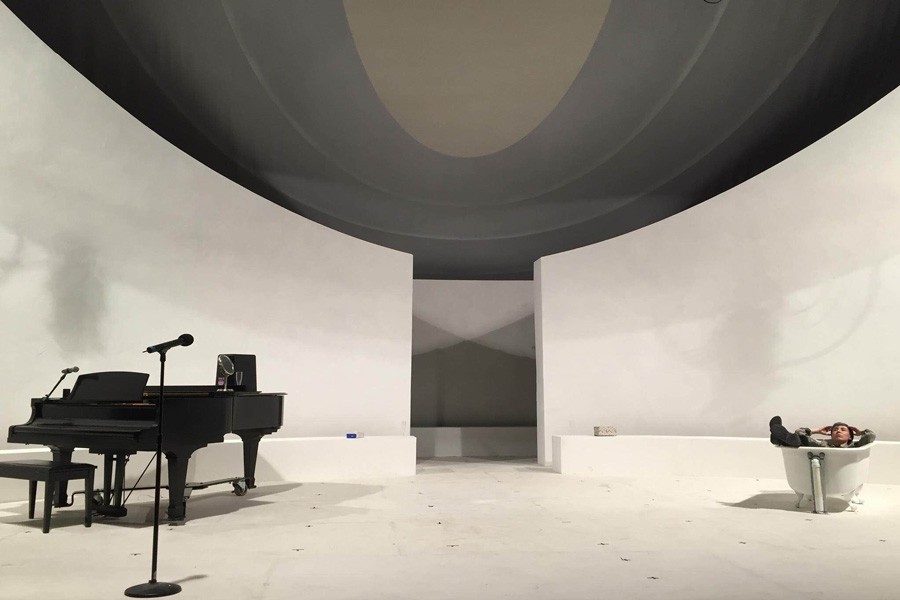‘Big Love’ production explores gender roles, features physical choreography
“Big Love” director Gina Marie Hayes sits on the set of the show. The upcoming production features fight choreography and an exploration of gender roles.
January 20, 2016
A&E
Energetic fight choreography will play a major role in “Big Love,” a play that challenges audiences to confront issues involving gender identity and family.
The production is playwright Charles L. Mee’s modern take on a classic Aeschylus play and is produced by the Virginia Wadsworth Wirtz Center for the Performing Arts.
“Movement is a huge part of the show,” said Communication junior Eddie Sanchez, a cast member. “We’ve had several four-hour rehearsals solely dedicated to choreographing the movement.”
Director Gina Marie Hayes, a directing graduate student, said the play touches on the danger of enforcing gender roles.
“I’m hopeful (the show) will make the audience see the expectations that they have for themselves (in their own lives),” she said. “They might be ostensibly male and female but those roles are arbitrary. Your internal compass will tell you what’s right for you and help you accept others.”
“Big Love” follows 50 brides as they flee from 50 grooms who want to force them into marriage. When the men find them, the women see no way out, until three sisters — Thyona, Olympia and Lydia — find a violent way to escape the marriages.
“It’s a Greek tragedy at the heart of it,” Hayes said. “It really requires the performers to go to some emotional and physical lengths and depths they haven’t had to go to in a lot of their work (before).”
Sanchez said the violent tone of the production, shown through movement and the plot, is there for a purpose. It is meant to leave the audience with a clear view of the damage that strict gender roles can cause, he said.
Communication sophomore Jacob Entenman said he plays Giuliano in the show, a male character who wears high heels. Giuliano doesn’t feel like he fits into any of the show’s defined gender roles, Entenman said.
“The show isn’t resolved in a very ‘happy’ way — it shows a harsh reality of love and what happens when love gets mixed up with other things,” he said.
Besides setting the drama in modern times, “Big Love” combines multiple styles of writing, tropes and movements that Hayes describes as a “collage-type form” of theater. This style of writing allows for a broad brainstorming process and extensive collaboration during rehearsals, she said.
“Gina is a big part of why the room feels so safe,” Sanchez said. “She’s very good at being sensitive to our needs. … Her directing is beautifully open-ended. She gives you an idea of what she wants, but you’re part of this collaboration with her in getting it done.”
The actors have had to master movement and fight choreography along with their lines, said Communication sophomore Shara Feit, who plays Bella in the show. She added the violent movement in the play is just as important to its plot as the script.
“It’s about creating a world that isn’t necessarily real,” she said. “We’re bringing goddesses (from the story) and putting them on this earth.”
Working with three choreographers, Hayes and the actors are refining the movements that will bring the drama to life, Entenman said.
“It’s not like, ‘turn, turn, look, hand,’ but it’s very physical and precise in the movements that we’re doing,” Entenman said. “The show itself is very much a large movement piece.”
Sanchez said he hopes the physicality of the show will help the audience confront the conversations the team hopes to start.
“One would hope that the over-the-top production strikes them, and that when they’re feeling that awe, they feel inclined to … digest the themes of gender and how it can be really damaging to everyone, universally,” Sanchez said.
The show does not feed a specific moral to the audience, Hayes said, but instead asks them to confront the questions, “Am I allowed to be who I want to be? Will I allow myself to be that?”
“Big Love” will run from Friday, Jan. 29, to Sunday, Feb. 7 in the Josephine Louis Theater.
Email: [email protected]
Twitter: @rdanielle1995


